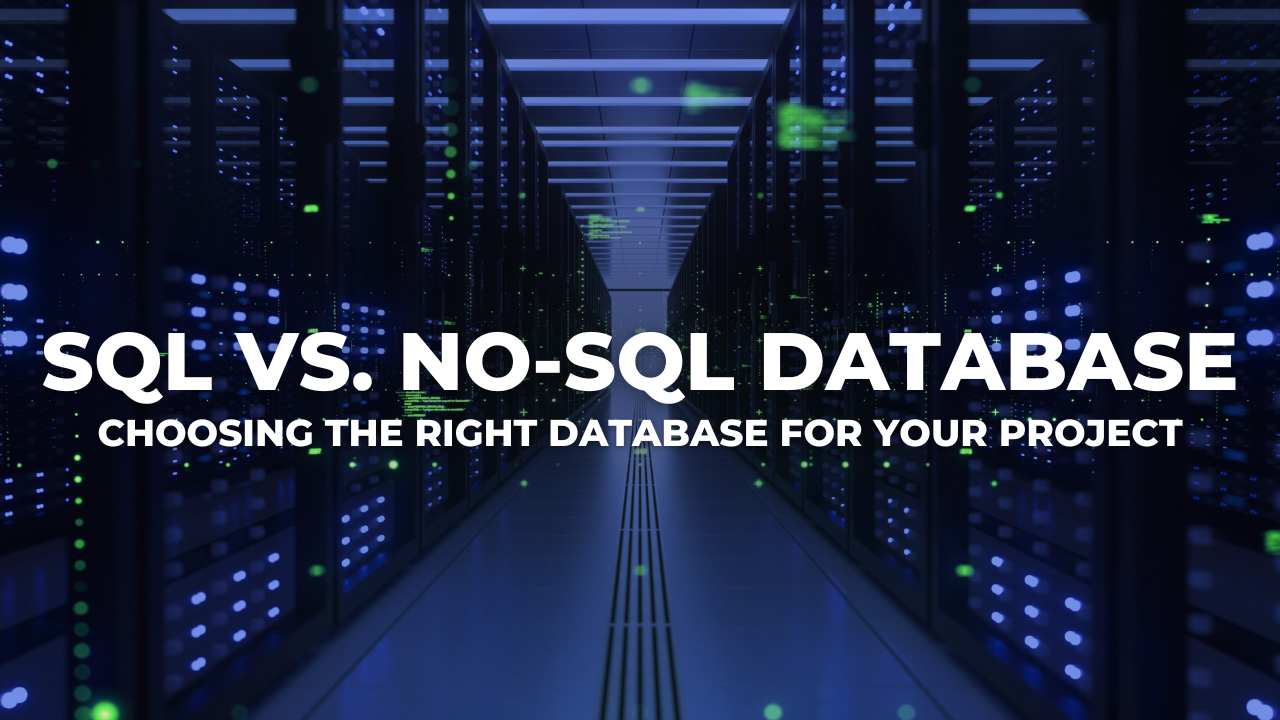Choosing the right database system is crucial for businesses of all sizes. SQL (Structured Query Language) and No-SQL (Not Only SQL) databases are two major contenders, each with its own strengths and weaknesses. In this comprehensive guide, we’ll delve deep into the world of databases, examining the merits of SQL and No-SQL databases, and helping you make an informed decision about which one best suits your business needs.
Understanding SQL Databases
What is SQL?
SQL, or Structured Query Language, is a powerful and time-tested relational database management system (RDBMS). SQL databases are known for their structured data storage and ability to enforce strict data integrity rules. Here are some key features of SQL databases:
- Data Integrity: SQL databases excel in maintaining data accuracy and consistency through enforced constraints.
- ACID Compliance: SQL databases ensure Atomicity, Consistency, Isolation, and Durability, making them highly reliable for transactional applications.
- Schema-based Structure: SQL databases use a predefined schema, which means data must conform to a fixed structure, ideal for applications with well-defined data models.
Examples of SQL Databases:
- MySQL: An open-source relational database management system, popular for web applications.
- Oracle Database: A robust, enterprise-grade database used in large organizations.
- Microsoft SQL Server: Ideal for Windows-based applications and enterprises.
- PostgreSQL: An open-source database known for its advanced features and extensibility.
- SQLite: A lightweight, self-contained database often used in mobile apps and embedded systems.
- IBM Db2: Suitable for complex enterprise solutions and AI applications.
- MariaDB: A MySQL fork with enhanced performance and security features.
- Amazon RDS: A cloud-based managed database service offering various SQL database engines.
Use Cases for SQL Databases
SQL databases are a perfect fit for applications that require:
- Transaction Management: Businesses handling financial transactions, e-commerce platforms, and banking systems rely on SQL databases for their robust transaction management capabilities.
- Complex Queries: SQL databases are adept at handling complex queries, making them suitable for reporting and data analytics applications.
- Data Integrity: When data accuracy and consistency are non-negotiable, SQL databases shine in maintaining data integrity.
Exploring No-SQL Databases
What is No-SQL?
No-SQL databases, as the name suggests, offer a departure from the traditional SQL structure. They are designed for handling unstructured or semi-structured data and offer greater flexibility in data modeling. Here are some key features of No-SQL databases:
- Schema-flexibility: No-SQL databases are schema-less, allowing you to store data without a predefined structure, making them suitable for applications with evolving data needs.
- Scalability: No-SQL databases are highly scalable and can handle massive amounts of data and high request rates, making them a preferred choice for web applications and big data solutions.
- Horizontal Partitioning: No-SQL databases can distribute data across multiple servers, ensuring high availability and fault tolerance.
Examples of No-SQL Databases
- MongoDB: A popular document-oriented NoSQL database, ideal for unstructured or semi-structured data.
- Cassandra: A distributed NoSQL database designed for handling large amounts of data across multiple servers.
- Couchbase: Combines NoSQL flexibility with the features of a traditional RDBMS.
- Redis: An in-memory key-value store often used for caching and real-time analytics.
- Amazon DynamoDB: A managed NoSQL database service with seamless scalability.
- Neo4j: A graph database for efficiently managing and querying interconnected data.
- Riak: A distributed NoSQL database known for its high availability and fault tolerance.
- HBase: Suitable for handling large datasets in a distributed environment, often used with Hadoop.
Use Cases for No-SQL Databases
No-SQL databases are well-suited for applications that demand:
- Big Data Processing: When dealing with vast volumes of unstructured data, No-SQL databases are the go-to solution for processing and analysis.
- Real-time Applications: Applications like social media platforms and IoT devices benefit from the low-latency, high-throughput capabilities of No-SQL databases.
- Agile Development: For projects where the data schema evolves rapidly, No-SQL databases provide the flexibility needed to adapt to changing requirements.
Making Your Choice
Now that we’ve explored the strengths of both SQL and No-SQL databases, let’s consider some factors to help you make an informed decision.
Factors to Consider
- Data Structure: If your application relies on a fixed and well-defined data structure, SQL databases are the way to go. For more flexible and evolving data needs, No-SQL databases are a better fit.
- Scalability: Consider the scale of your application. If it needs to handle massive data growth, No-SQL databases offer seamless horizontal scalability.
- Data Integrity: If maintaining data integrity is paramount, SQL databases provide robust transactional support and enforced constraints.
- Development Speed: No-SQL databases allow for quicker development, as they don’t require strict schema adherence.
- Query Complexity: For applications with complex reporting and querying needs, SQL databases are a better choice due to their mature query languages.
Yeah, and…?
In the SQL vs. No-SQL battle, there’s no one-size-fits-all solution. Your choice should align with your business requirements and the specific demands of your application. SQL databases offer structured data integrity and are perfect for applications with a fixed schema. On the other hand, No-SQL databases provide flexibility and scalability for projects dealing with unstructured or evolving data.
Assess your project’s needs, consider factors like data structure, scalability, and query complexity, and make an informed decision. Whichever database you choose, remember that both SQL and No-SQL have their place in the ever-expanding world of data management.
So, whether you’re building the next generation of e-commerce platforms or harnessing the power of big data, the choice between SQL and No-SQL is yours to make.






0 Comments